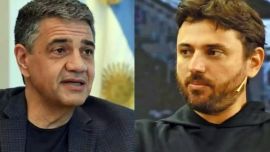Latin America is ratcheting up its response to the coronavirus pandemic, with governments across the region announcing a series of new measures.
Presidents in Venezuela, Colombia, Chile and Uruguay went on national television Friday to report the partial closure of borders, quarantine measures, and the banning of large public events.
It was Venezuela, though, with its healthcare system in crisis after years of economic collapse, that announced the strictest measures. President Nicolás Maduro said all schools and universities would be closed and that workplaces would follow suit in the next few days. The country has already suspended many flights, while the opposition has cancelled street protests.
Colombia’s President Iván Duque said he was closing the nation’s border with Venezuela as of 5am Saturday. Tens of thousands of Venezuelans cross the border every day in search of food or medicines, or simply to flee the country. Venezuela’s government criticised the measure.
Ecuador announced Saturday that it was closing all ports of entry, baring foreigners from entering the country via air, sea or bus as of Monday.
Cases rising
While the number of coronavirus cases in Latin America remains relatively low, they’re rising steadily. Brazil now has 121 confirmed cases, Chile has 61 cases, Peru 38, Argentina 45 and Mexico 23. Uruguay and Venezuela each have fewer than 10.
Chile’s President Sebastián Piñera warned Friday that an additional 2,000 people in the country are at imminent risk of infection. He pledged more funds for the healthcare system to buy equipment, while stepping back from the immediate closure of schools.
Chile's Health Ministry said it could no longer trace all new cases to infections abroad and that the epidemic was entering a new phase.
Surrounded by his ministers, Uruguay’s President Luis Lacalle Pou, who was sworn into office this month, declared a health emergency on Friday, with the partial closure of the country’s borders.
In both Chile and Uruguay, schools will only close once they have registered cases of coronavirus among students.
The exception
Mexico has taken a more relaxed approach to the pandemic. Guns n’ Roses is headlining a two-day music festival this weekend that attracted 90,000 a day last year. Passengers arriving from Europe by plane still receive no medical checks.
A low count of cases since February 28 has led some experts to doubt whether Mexico is performing enough tests.
Still, the government brought forward the closure of schools for the Easter holiday to March 20 from April 6. The extended break will last through to April 20.
In Brazil, where President Jair Bolsonaro was declared free of the disease on Friday, governors in the states of Sao Paulo, Brasilia and Rio have suspended classes, and banned large events and prison visits.
related news
by Philip Sanders, Bloomberg
























Comments